Table of Contents[Hide][Show]
- 1. Elements of AI
- 2. Python for Data Science, AI & Development
- 3. AI for everyone
- 4. AI for Good
- 5. AI Foundations for Everyone Specialization
- 6. Artificial Intelligence A-Z 2023
- 7. Introduction to Artificial Intelligence (AI)
- 8. Machine Learning Specialization
- 9. Deep Learning Specialization
- 10. Mathematics for Machine Learning and Data Science
- 11. IBM Applied AI Professional Certificate
- 12. Introduction to Computer Vision and Image Processing
- 13. Modern Artificial Intelligence Masterclass: Build 6 Projects
- 14. Artificial Intelligence with Machine Learning, Deep Learning
- 15. Deep Learning A-Z 2023
- Conclusion
In an increasingly linked and data-driven world, the arrival of AI is a monument to human brilliance.
The essence of AI, anchored in machine emulation of human intellect, finds relevance in a wide range of applications, driving disruptive advances throughout industries.
The impact is substantial and far-reaching, ranging from healthcare, where AI-powered diagnostics provide early illness diagnosis, to education, finance, and beyond.
Automation of regular work advances in data analysis, and the possibility for improved user experiences are just a few of the areas in which AI shines brilliantly.
The dynamic inherent in the area of AI needs a commitment to continual learning. As the boundaries of what is conceivable continue to blur, remaining current on developing processes and technology is not just recommended, but also required.
This is an area where yesterday’s discoveries soon become today’s standards, underlining the fast-paced character of innovation at work. The never-ending pursuit of relevance in a terrain peppered with ongoing improvements emphasizes the need for an ever-evolving learning experience.
Furthermore, with a growing need for AI knowledge, there is a sense of urgency for ambitious engineers to dig into the core of this interesting science.
The prospect of deciphering the complexities of machine learning, deep learning, and neural networks entices.
However, the route to mastering AI is frequently seen as difficult, particularly by those on the cusp. It is at this point that the importance of well-structured educational courses becomes clear.
As we move into the domain of AI education, a profusion of courses has sprung up to meet the surge of eager students.
These courses, which are tailored to different learning paces and prior knowledge, attempt to flatten the learning curve, making the introduction into AI less intimidating.
A handpicked collection of AI courses for beginners acts as a stepping stone into this intriguing realm. These courses, which are intended to give a strong foundation, cover a wide range of AI ideas to provide a well-rounded knowledge.
They clarify the fundamental concepts, give hands-on experience, and offer a look into the real-world applications of AI.
Starting an organized learning route is like opening a door to a future full of possibilities. The path to mastering AI can be both thrilling and rewarding with the correct coaching.
The following selected collection of AI courses is designed to give a strong foundation, kindling the spark of interest and setting the groundwork for a gratifying voyage in the exciting realm of AI.
1. Elements of AI
MinnaLearn and the University of Helsinki have created a revolutionary series of free online courses called The Elements of AI.
Its goal is to demystify AI and enable a wide range of people, regardless of background, to understand it. There are two primary sections to the course.
The first section, “Introduction to AI,” is a simple module that doesn’t require any prior programming knowledge or advanced arithmetic. It’s ideal for anyone who wants to learn more about AI, its possibilities, and how it affects our daily lives.
This part provides a strong basis for comprehending AI fundamentals. “Building AI,” the second section, explores the algorithms in greater detail that make it possible to create AI techniques.
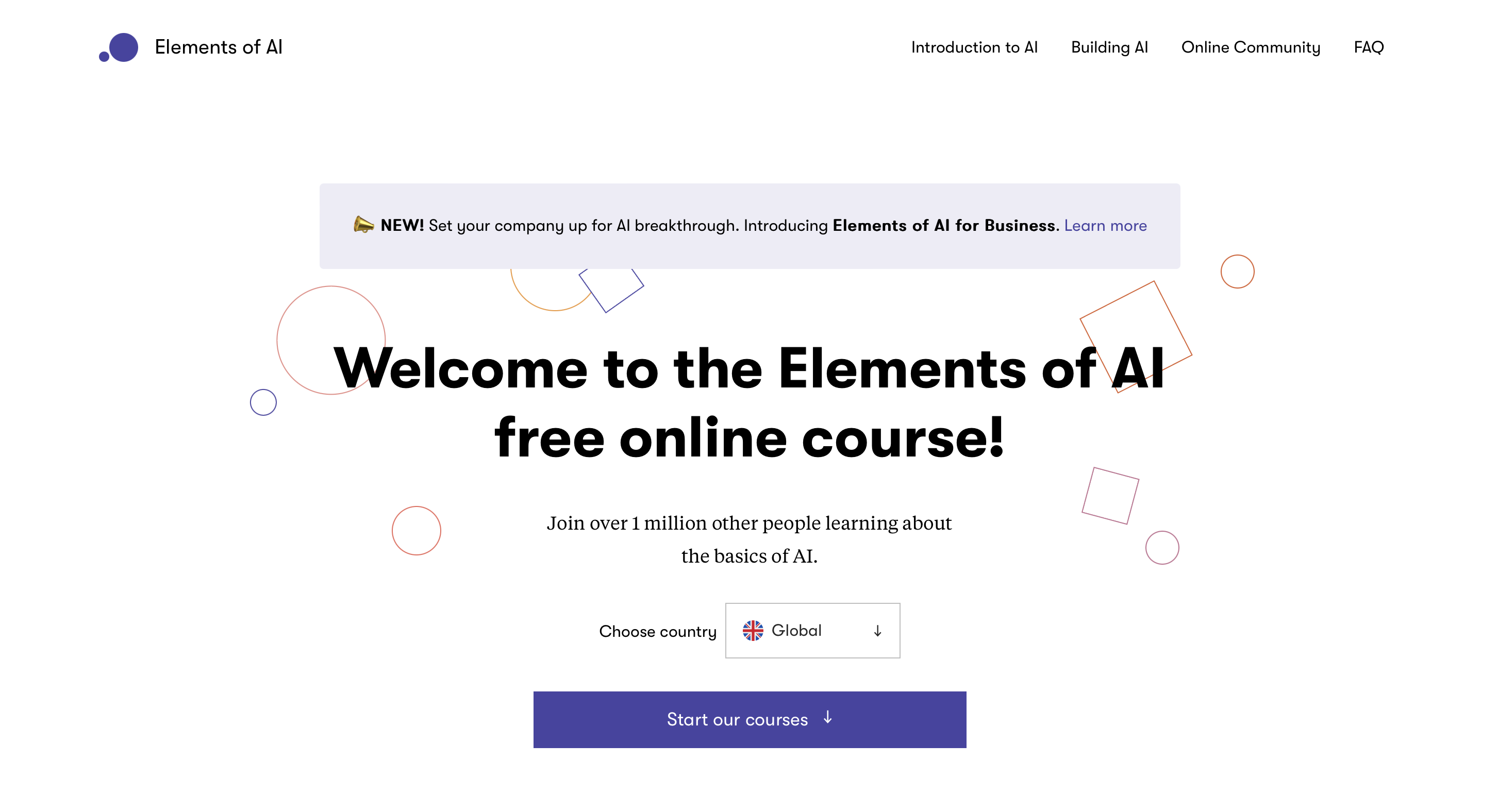
For complete involvement in this more technical lesson, some fundamental knowledge of Python programming is advised.
It’s perfect for individuals who wish to go further into the application of AI development and go beyond the fundamentals.
The Elements of AI stands out for its dedication to democratizing and empowering AI knowledge. Learning the ins and outs of AI is not as important as comprehending its potential applications across a range of industries.
The course emphasizes that AI is not just for engineers but for everybody interested in the future of technology, and it promotes a variety of uses of the technology.
2. Python for Data Science, AI & Development
The “Python for Data Science, AI & Development” course, produced by IBM and available on Coursera, is a comprehensive course meant to expose learners to the world of Python programming.
Specifically in the areas of data science, artificial intelligence, and development.
With the format of this beginner-friendly course, you can learn to program in Python in a couple of hours, even if you have no prior programming expertise.
You will acquire a foundational understanding of Python throughout the course, covering variables, data structures, expressions, and data types.
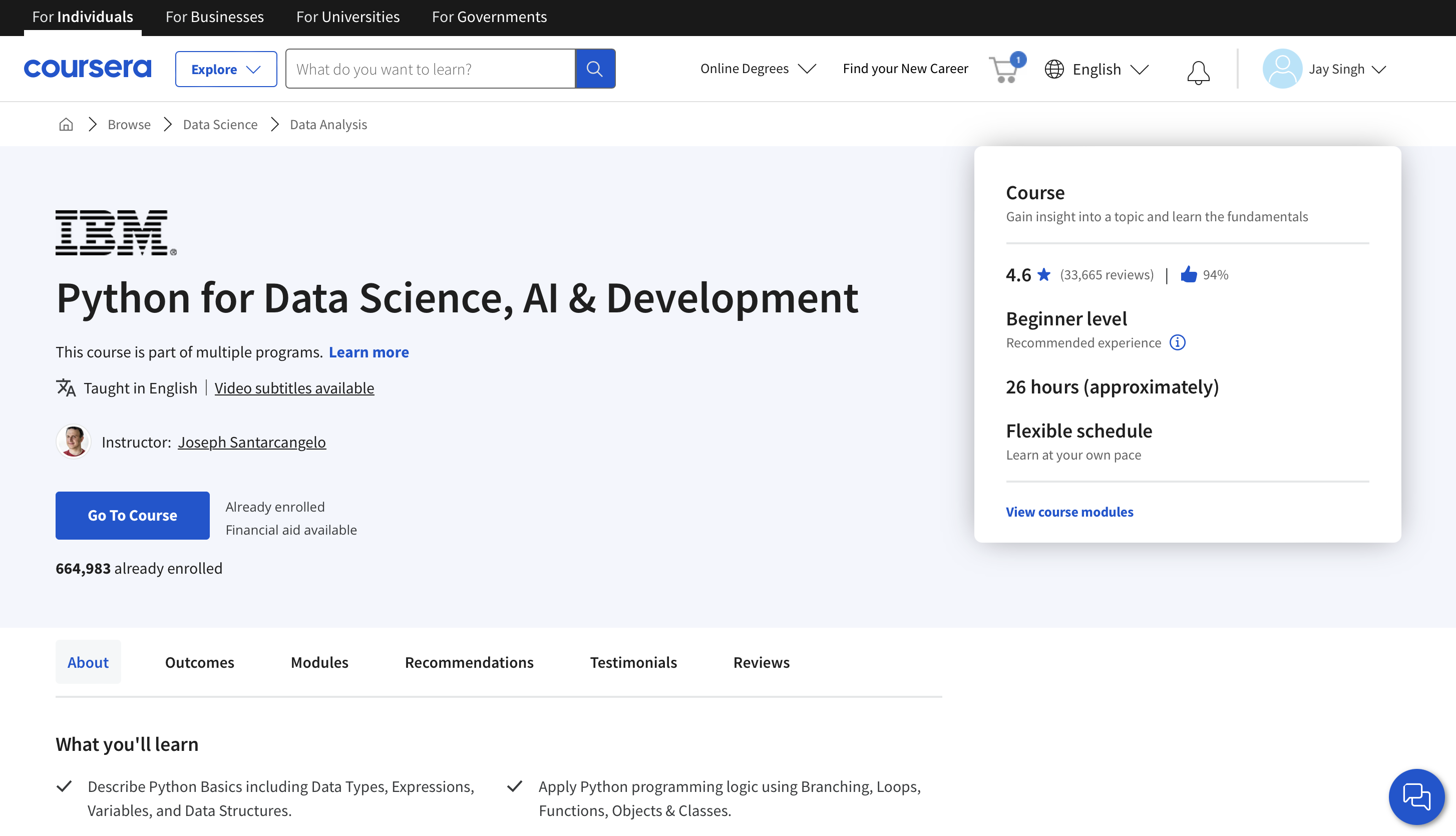
You will become proficient in branching, loops, functions, objects, and classes in Python programming logic. The usage of Python libraries—like Pandas, Numpy, and Beautiful Soup—which are crucial for data analysis and manipulation is also covered in the course.
This course’s practical methodology is one of its distinctive features. During practical labs with Jupyter Notebooks, you will be able to put your newly acquired knowledge to use.
As it enables you to deal with genuine data and address actual issues, this practical experience is priceless.
Upon finishing the course, you will have gained confidence in using Python to create simple programs, interact with data, and automate everyday chores.
A wide range of industries, including software development, data engineering, artificial intelligence, DevOps, and data science and analytics, can benefit from the skills you acquire.
3. AI for everyone
“AI for Everyone,” a course provided by deeplearning.ai, is designed for anyone who wants to learn about the revolutionary potential of artificial intelligence without getting bogged down in the details.
This course walks you through the societal and commercial implications of artificial intelligence while offering a thorough understanding of what it can and cannot achieve.
Regardless of one’s technical expertise, it aims to demystify AI principles and make them understandable to a wider audience.
During the course, you will learn more about the inner workings of machine learning and deep learning, two areas of artificial intelligence that have attracted a lot of interest lately.
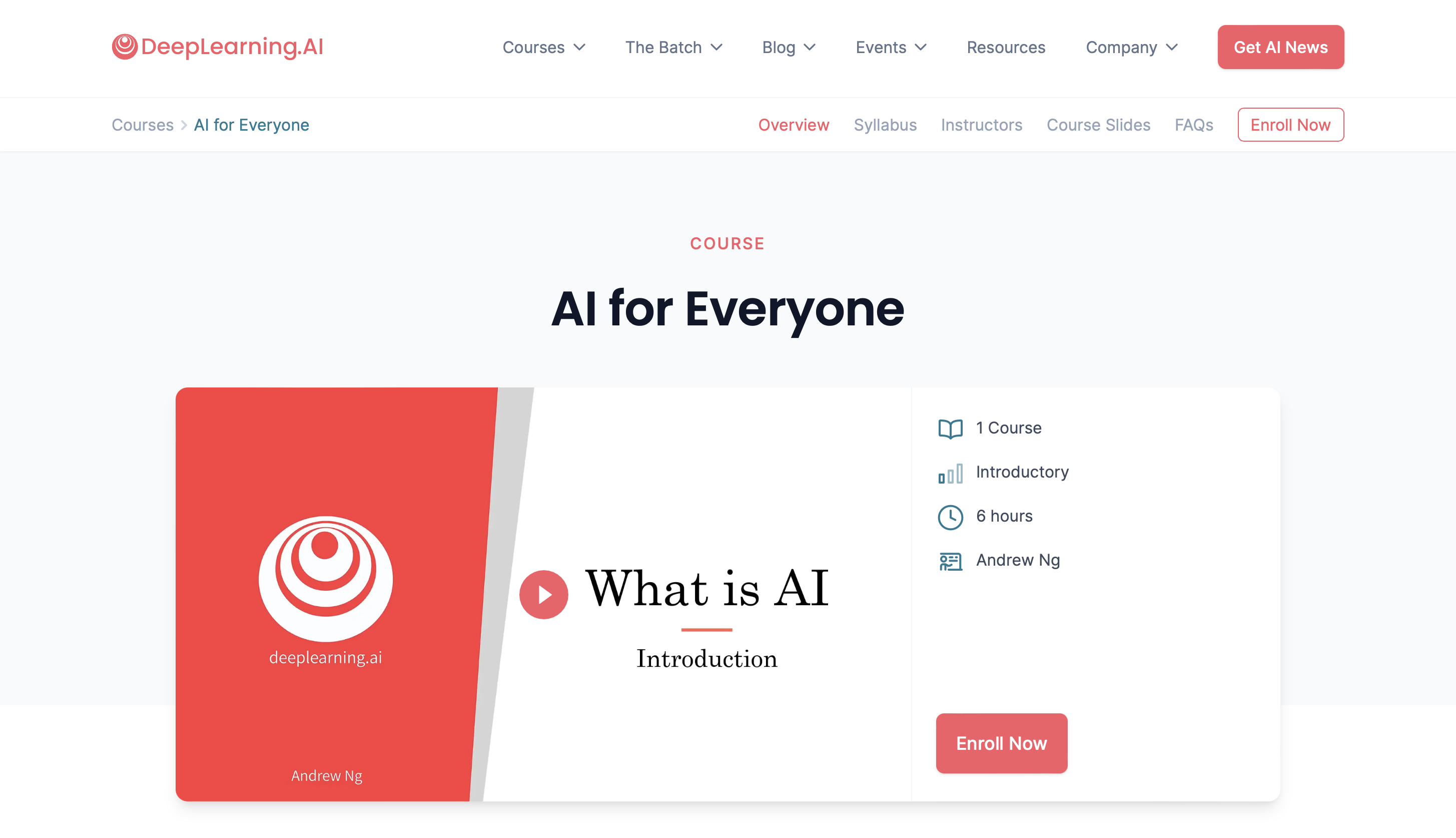
Additionally, you’ll study real-world case studies that demonstrate the useful uses of artificial intelligence in a range of sectors.
To ensure that students are prepared to make wise judgments in their domains, the course also addresses the ethical issues surrounding AI.
The focus on the commercial implications of AI in “AI for Everyone” is one of its most notable components.
Participants will gain knowledge of the tactics for creating a data-centric company and learn how to successfully traverse the AI revolution in their own firms.
Learners will graduate from this course with the skills necessary to apply AI-driven methods in their professional activities, in addition to a basic grasp of the field.
4. AI for Good
The “AI for Good” course is a cutting-edge initiative from deeplearning.ai that aims to use artificial intelligence to solve difficult global issues.
This course offers a rare chance to develop abilities that mix computer and human intelligence for beneficial effects in the real world.
It is designed to be easily understood by professionals, students, and anyone who is enthusiastic about improving society and the environment.
You will learn a methodical foundation for creating AI projects throughout the course.
For projects centered on biodiversity monitoring, wind energy, air pollution, and disaster management, you will evaluate data and create AI models.
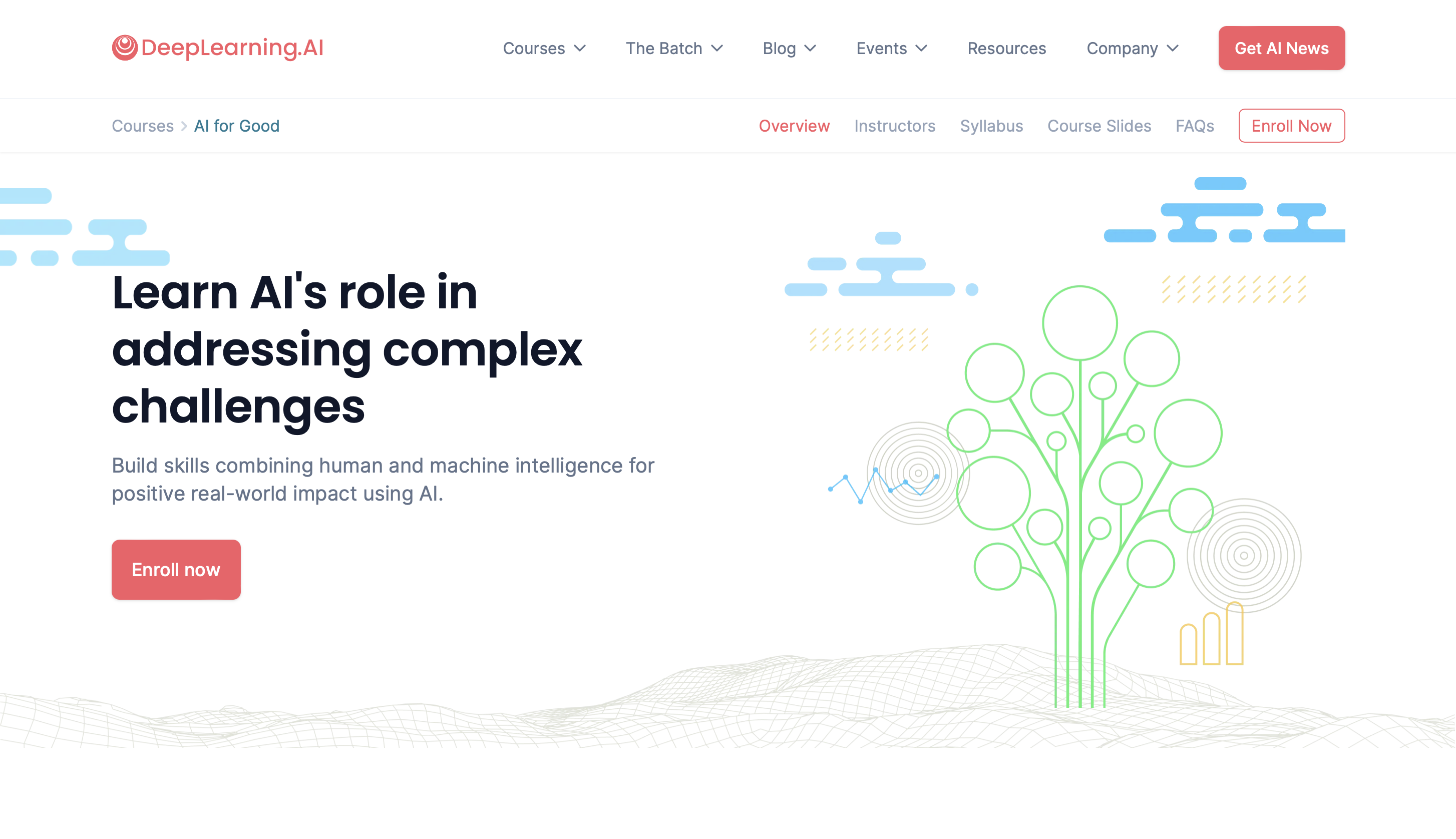
In order to provide you with a practical grasp of AI applications, the course also examines real-world case studies pertaining to public health, climate change, and disaster management.
You’ll discover how to create an AI model to increase the predictability of wind power generation, utilize computer vision techniques to recognize and categorize animals for biodiversity monitoring, and assess air quality using neural networks.
The course also covers using natural language processing techniques to text messages delivered after catastrophes and developing an image classification pipeline for damage assessment using satellite photos.
AI for Good project framework, Jupyter Notebooks, computer vision, supervised machine learning, natural language processing, exploratory data analysis, and more are among the skills you will acquire.
You will have the skills and information required to work on AI for Good projects and create products that employ AI for environmental and humanitarian causes by the conclusion of the course.
5. AI Foundations for Everyone Specialization
The comprehensive course “AI Foundations for Everyone Specialization” that IBM is offering on Coursera is intended to acquaint students with the field of artificial intelligence (AI). This specialty does not need programming knowledge and is designed for those with little to no experience with AI.
For students interested in learning about AI’s effects and revolutionary possibilities for society and businesses, this is a great place to start.
Three courses make up the specialty, each concentrating on a distinct area of artificial intelligence. In the first course, “Introduction to Artificial Intelligence (AI),” students are given a general understanding of the technology, its uses, and how it is changing society.
You will gain knowledge of AI ethics, deep learning, neural networks, machine learning, and other related topics.
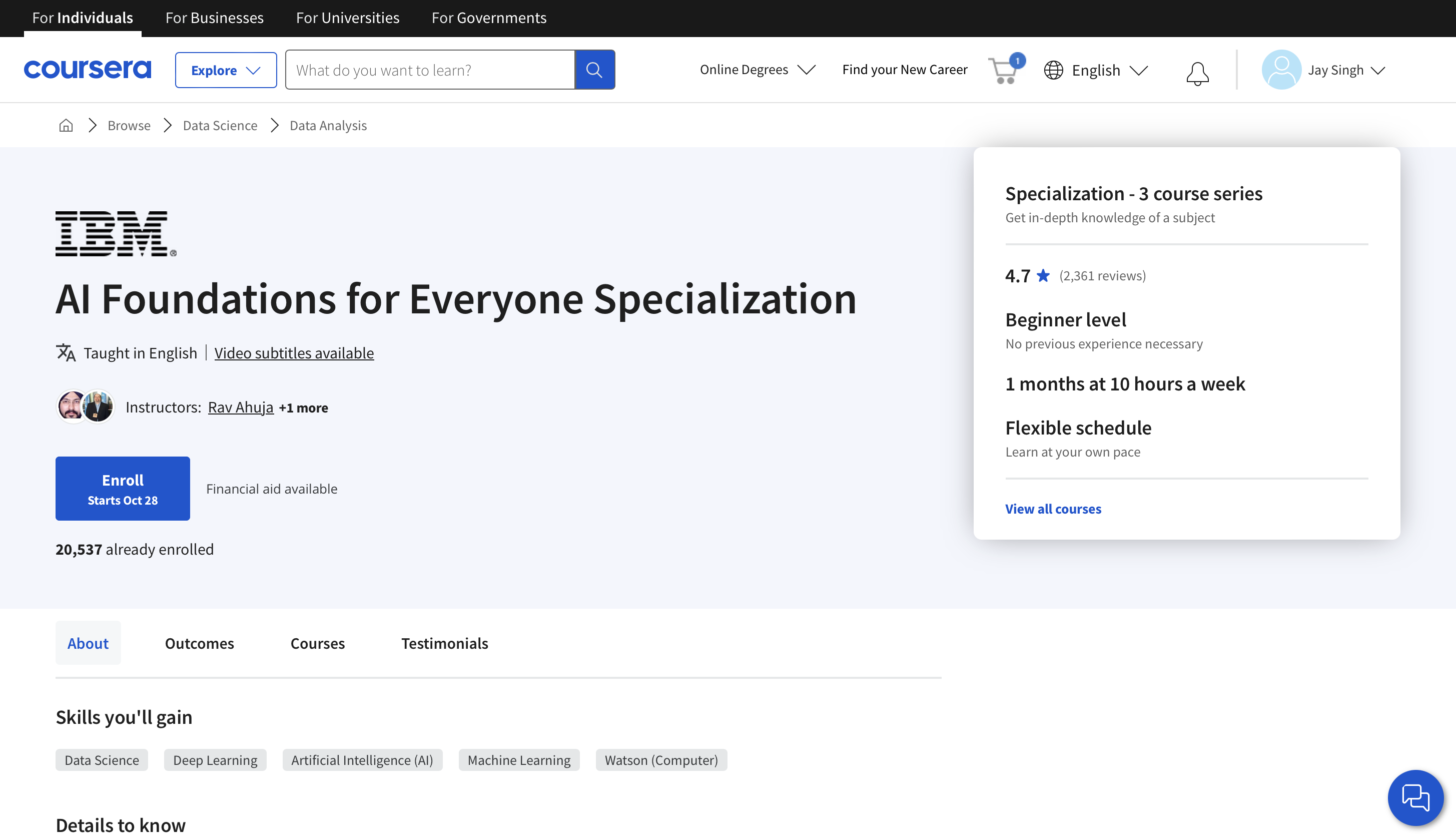
The second course delves into the uses of Watson AI services, titled “Getting Started with AI using IBM Watson.”
You’ll discover how to maximize duties in a work setting and increase productivity using programs like Watson Studio. The features and functions of IBM Watson Services within an AI lifecycle are also covered in this course.
The final course, “Building AI-Powered Chatbots Without Programming,” focuses on building chatbots without the need to write code.
The advantages of chatbots, how to utilize Watson Assistant to build a user-friendly chatbot, and how to integrate it with a website will all be covered.
You will complete a number of hands-on, code tasks during the specialization. A Watson AI-powered customer support chatbot on a website will have been created, tested, and implemented by the end.
6. Artificial Intelligence A-Z 2023
The precisely designed course “Artificial Intelligence A-Z 2023” unlocks a treasure mine of knowledge that allows you to dig deep into the world of Artificial Intelligence (AI).
This course walks you through the fundamentals from the very beginning, making sure that a strong foundation is established.
The complexities of artificial intelligence are revealed as you go along, providing an insight into the powerful potential of this innovative technology. Each module in the course builds on the one before it, with the goal of facilitating progressive learning.
This gives your learning trajectory a beat, which facilitates the far easier assimilation of intricate AI notions. Here, practical assignments that are both interesting and very perceptive are used to refine your comprehension.
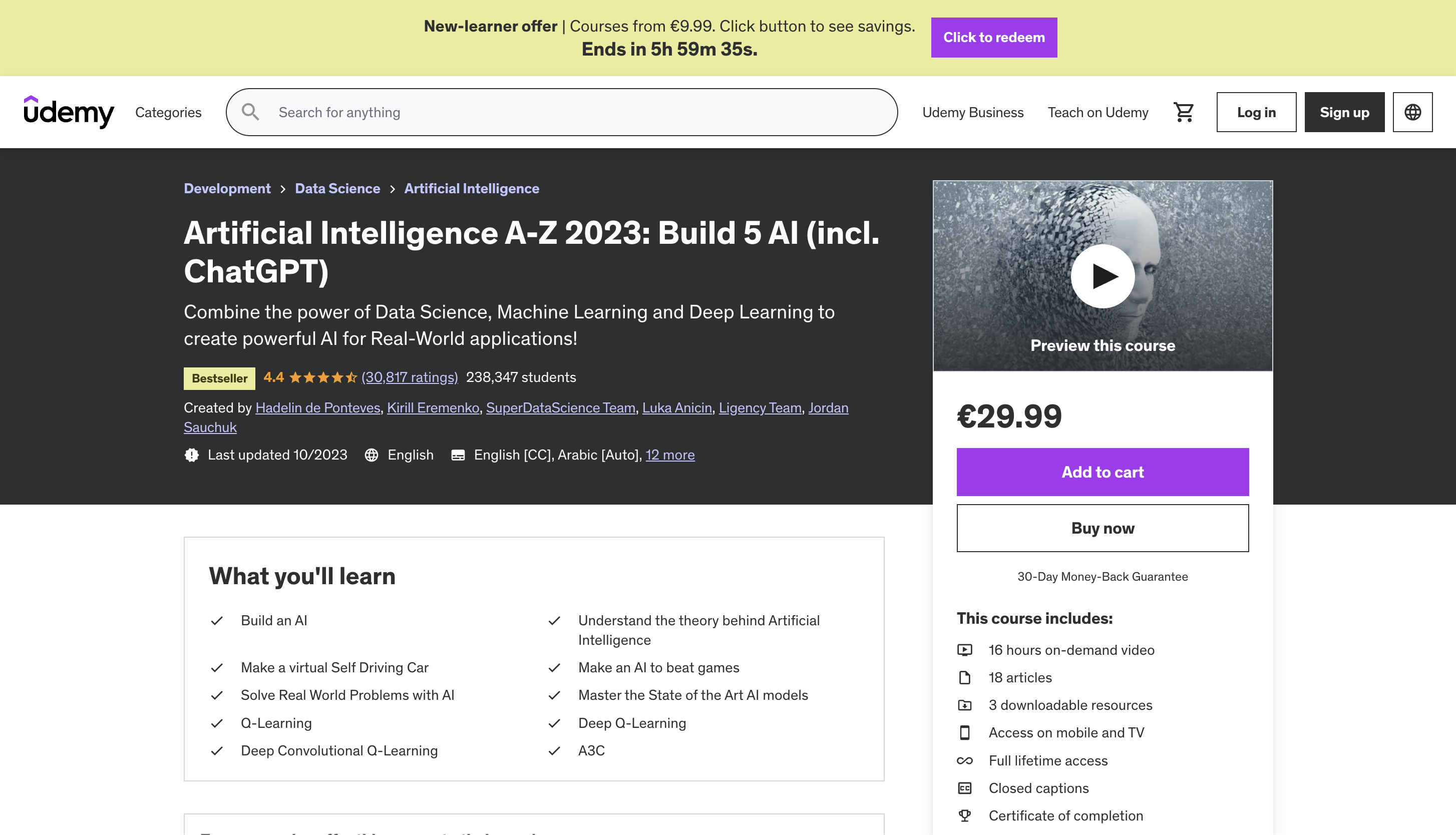
You will get the opportunity to work with real-world data, and you will be thrilled by the challenge of extracting valuable insights from it.
This course stands out because of its capacity to demystify theoretical ideas via real-world application. Instead of just being a passive information consumer, you’re thrust into a vibrant learning environment.
There are several obstacles in this course that will test your ability to think critically and solve problems.
This course equips you with the skills necessary to use this information successfully, in addition to providing you with the necessary knowledge.
7. Introduction to Artificial Intelligence (AI)
Immerse yourself in the fascinating field of artificial intelligence by taking Coursera’s “Introduction to Artificial Intelligence (AI)” course.
This course ensures a strong foundation in the core ideas of AI and opens the path for a deep understanding of the field.
You are led from the beginning through a rigorous learning route that carefully reveals the many aspects of artificial intelligence.
The way the material is organized in the course ensures that knowledge is built gradually and that each module flows naturally into the next.
This well-considered method fosters a profound comprehension of AI concepts in addition to making learning easier.
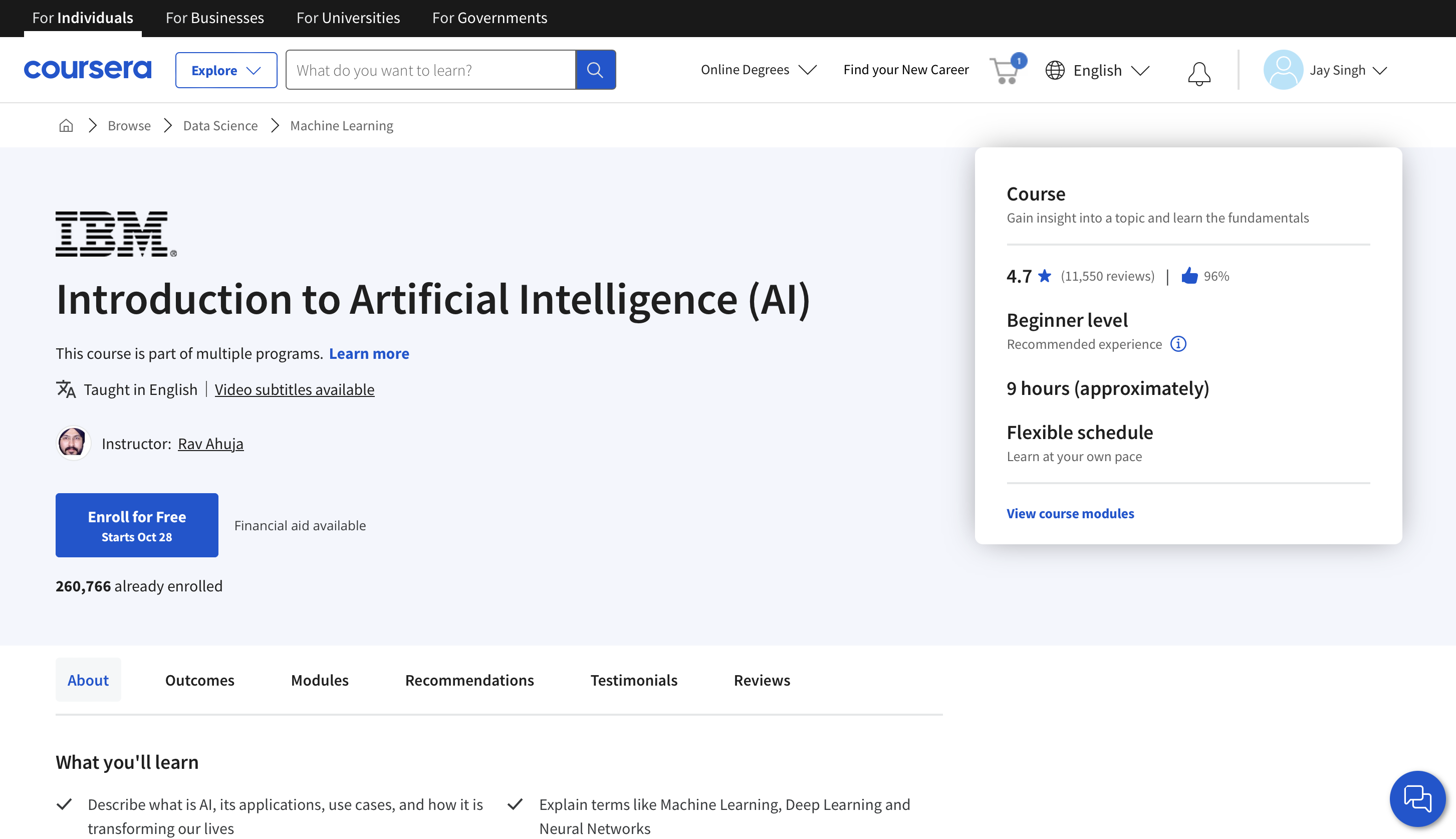
The program covers a wide range of subjects, including deep learning, machine learning, neural networks, and more.
You are delving into the heart of artificial intelligence and investigating the mechanics that power intelligent systems—you are not just skimming the surface.
The course is filled with practical exercises that provide you with a hands-on approach to learning. Engaging with real-world datasets is a fascinating and instructive experience that is provided to you.
You are forced into an interesting, dynamic learning environment by the course, which does not reduce you to a passive student.
The objective of the course is to test your ability to think critically and solve problems. Applying knowledge in relevant, real-world situations is just as important as just receiving it.
8. Machine Learning Specialization
Stanford University and DeepLearning.ai provide a Machine Learning Specialization.
The complete AI program offered by Coursera is meant to give students a solid foundation in AI theory as well as useful machine learning abilities.
Participants in this specialty will explore a broad range of machine-learning subjects. Initially, they will use well-known Python tools like NumPy and scikit-learn to construct machine learning models.
Both supervised and unsupervised learning strategies are covered in the course.
You will learn how to create and train models for binary classification and prediction problems, such as logistic and linear regression, using supervised learning. Additionally, you will receive practical neural network training using TensorFlow for multi-class classification.
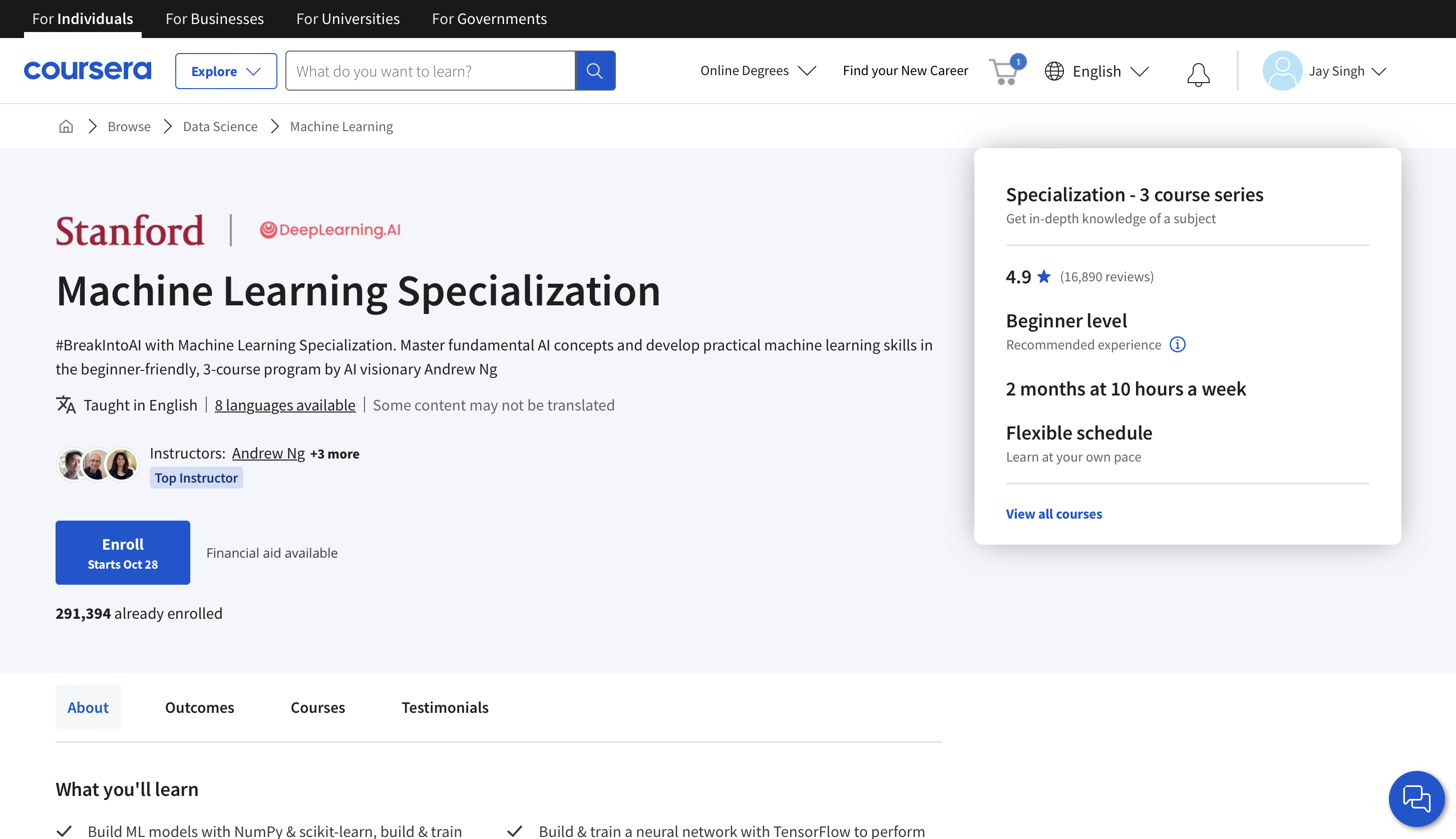
The course covers clustering and anomaly detection in the context of unsupervised learning, giving students the tools they need to work with data that lacks labeled answers.
The specialization also includes tree ensemble techniques, such as boosted trees, random forests, and decision trees.
This course’s emphasis on developing recommender systems via content-based deep-learning techniques and collaborative filtering strategies is one of its distinctive features.
Additionally, deep reinforcement learning models are introduced to you. The focus of the specialty is on machine learning development best practices, which guarantees that student-built models are well-suited to real-world tasks and data.
You will graduate from the program with a solid grasp of fundamental machine learning ideas as well as the hands-on skills necessary to use these methods to tackle difficult real-world problems.
9. Deep Learning Specialization
DeepLearning.AI’s Deep Learning Specialization is an introductory curriculum that introduces students to deep learning and artificial intelligence.
The straightforward, short, and self-paced nature of this online course, taught by machine learning pioneer Andrew Ng, makes it accessible to individuals just starting out on their AI adventure.
Starting with the fundamental idea of neural networks, you will study a variety of deep learning subjects in this specialty.
You will gain knowledge of the essential components of a neural network’s architecture as well as how to construct, train, and use fully connected deep neural networks.
The course also explores the key technological developments that underpin the applications of deep learning. As you advance, you’ll learn useful strategies for launching your AI projects and building a portfolio that is relevant to the industry.
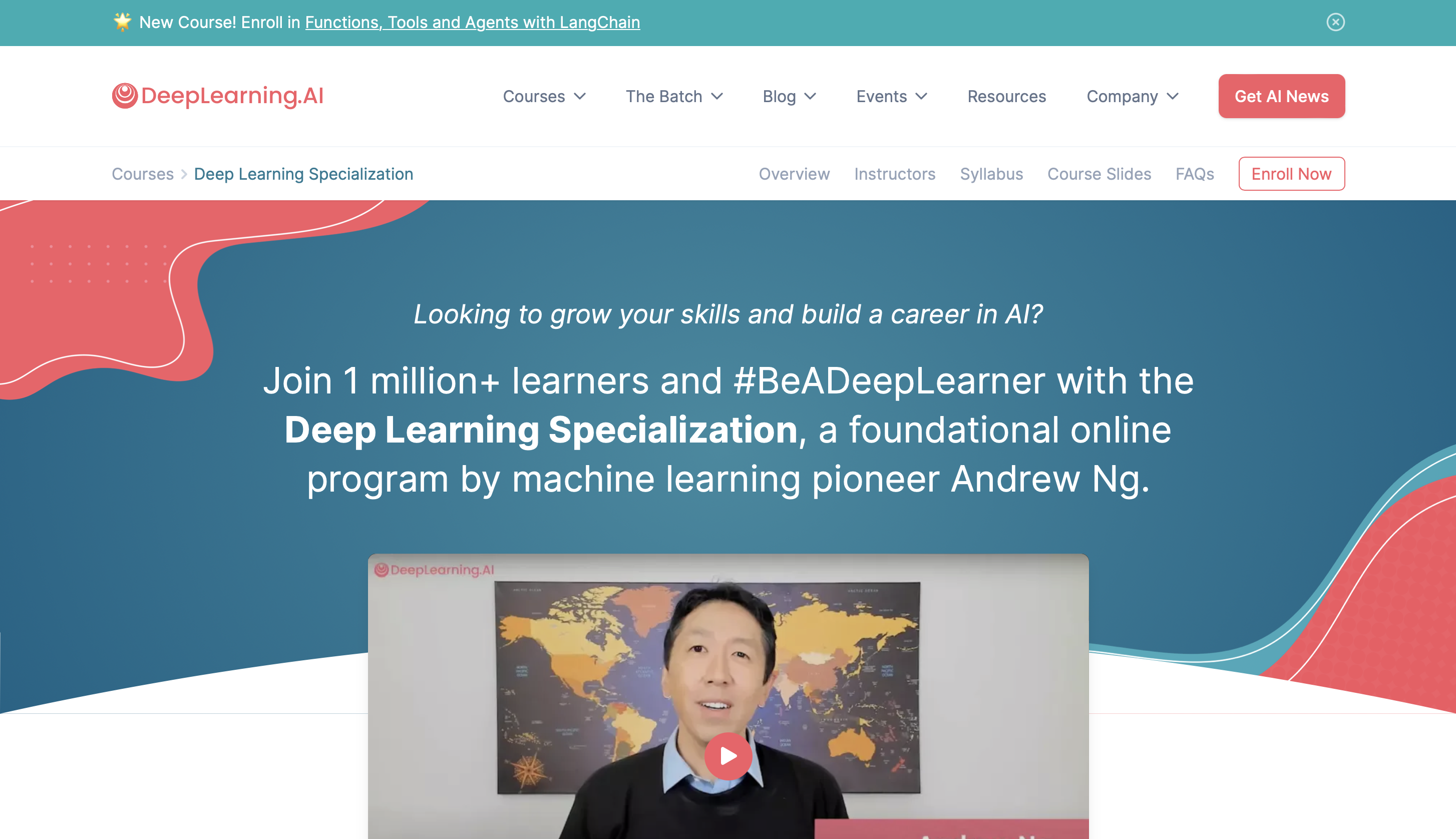
TensorFlow, transformers, convolutional neural networks, recurrent neural networks, artificial neural networks, and Python programming are all covered in this specialty.
Long short-term memory (LSTM), attention models, natural language processing, object detection and segmentation, face recognition systems, optimization, hyperparameter tuning, machine learning, transfer learning, backpropagation, and facial recognition systems are among the other topics you’ll study.
Five classes that each concentrate on a distinct facet of deep learning make up the program’s framework.
Neural networks and deep learning, deep neural network optimization, machine learning project organization, convolutional neural networks, and sequence models are a few examples.
Every course is meant to be built upon the one before it, guaranteeing a thorough comprehension of deep learning.
10. Mathematics for Machine Learning and Data Science
DeepLearning.AI’s “Mathematics for Machine Learning and Data Science” specialty is a beginner-friendly curriculum that provides learners with the foundational mathematics toolbox required for machine learning.
This course is ideal for anybody wishing to enhance their mathematical basics for a job in machine learning and data science, as it just requires a high school level of mathematics as a prerequisite.
This course will teach you essential mathematical topics such as calculus, linear algebra, statistics, and probability. These fundamental abilities are required for efficiently comprehending and applying machine learning algorithms.
The course is organized into three sections: Linear Algebra for Machine Learning and Data Science, Calculus for Machine Learning and Data Science, and Probability and Statistics for Machine Learning and Data Science.
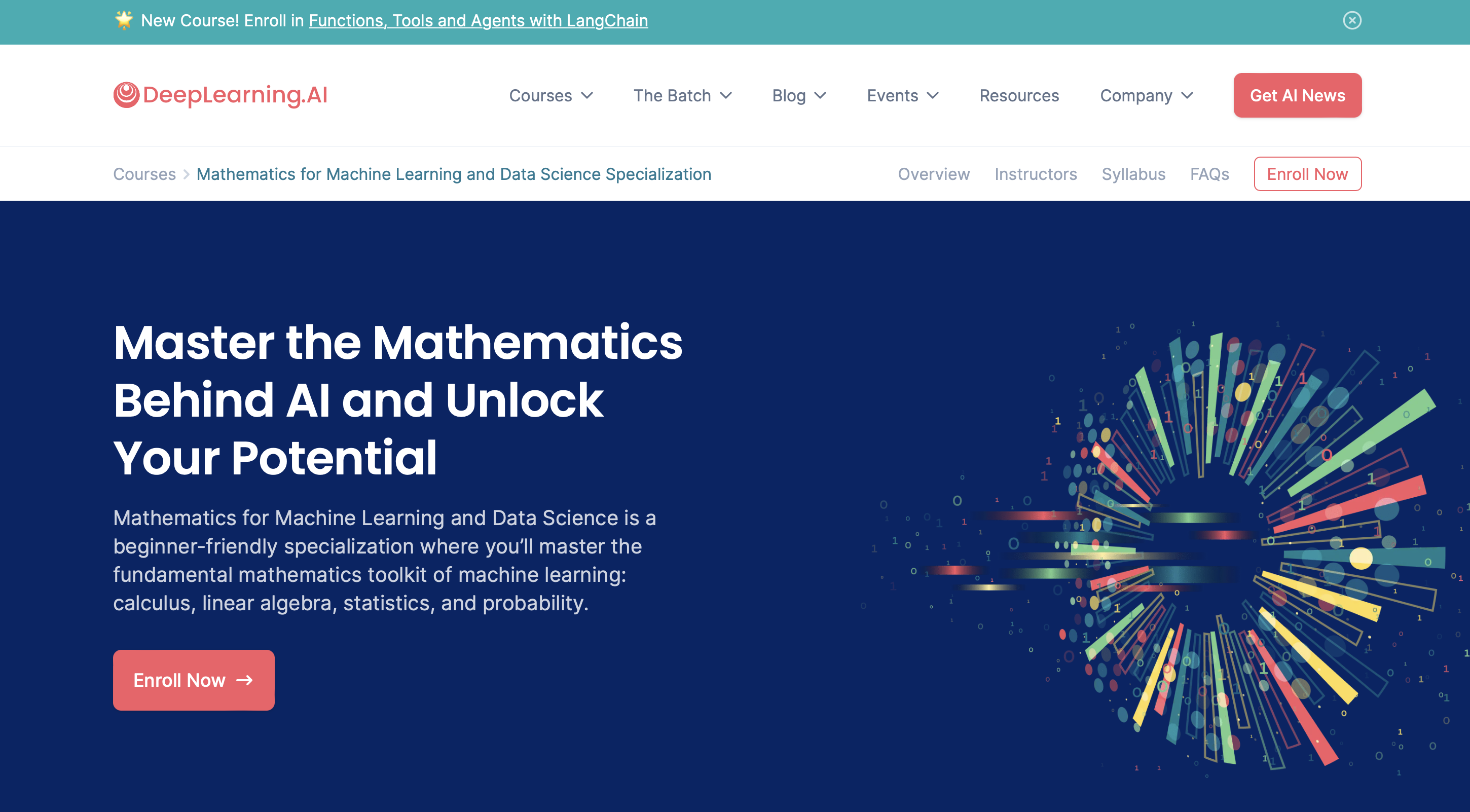
You’ll begin by learning about vectors, matrices, linear transformations, and eigenvalues, all of which are essential for comprehending machine learning models.
The course then digs into calculus, teaching you about derivatives, gradients, and optimization techniques like gradient descent, all of which are required for training neural networks.
In the probability and statistics part, you’ll learn about random variables, the Bayes theorem, Gaussian distributions, and hypothesis testing, as well as statistical tools for data analysis.
By the end of the course, you will have a thorough knowledge of the mathematical concepts that underpin algorithmic behavior and how to adapt them for custom implementation.
Employers value these talents, and they will help you conquer machine-learning interview questions and obtain your ideal job.
11. IBM Applied AI Professional Certificate
The IBM Applied AI Professional Certificate, which is available on Coursera, is a comprehensive curriculum designed to get you started in the field of artificial intelligence.
This course, led by IBM specialists, is ideal for beginners and doesn’t require any prior programming or artificial intelligence knowledge.
With a projected completion period of three months at ten hours per week, it is flexible enough to allow you to learn at your own speed.
You will obtain a thorough grasp of artificial intelligence (AI), its uses, and use cases in this course.
To begin, familiarize yourself with the meaning of artificial intelligence and define concepts like deep learning, machine learning, and neural networks.
Learning to build AI chatbots and virtual assistants on websites without any programming knowledge is one of the course’s features.
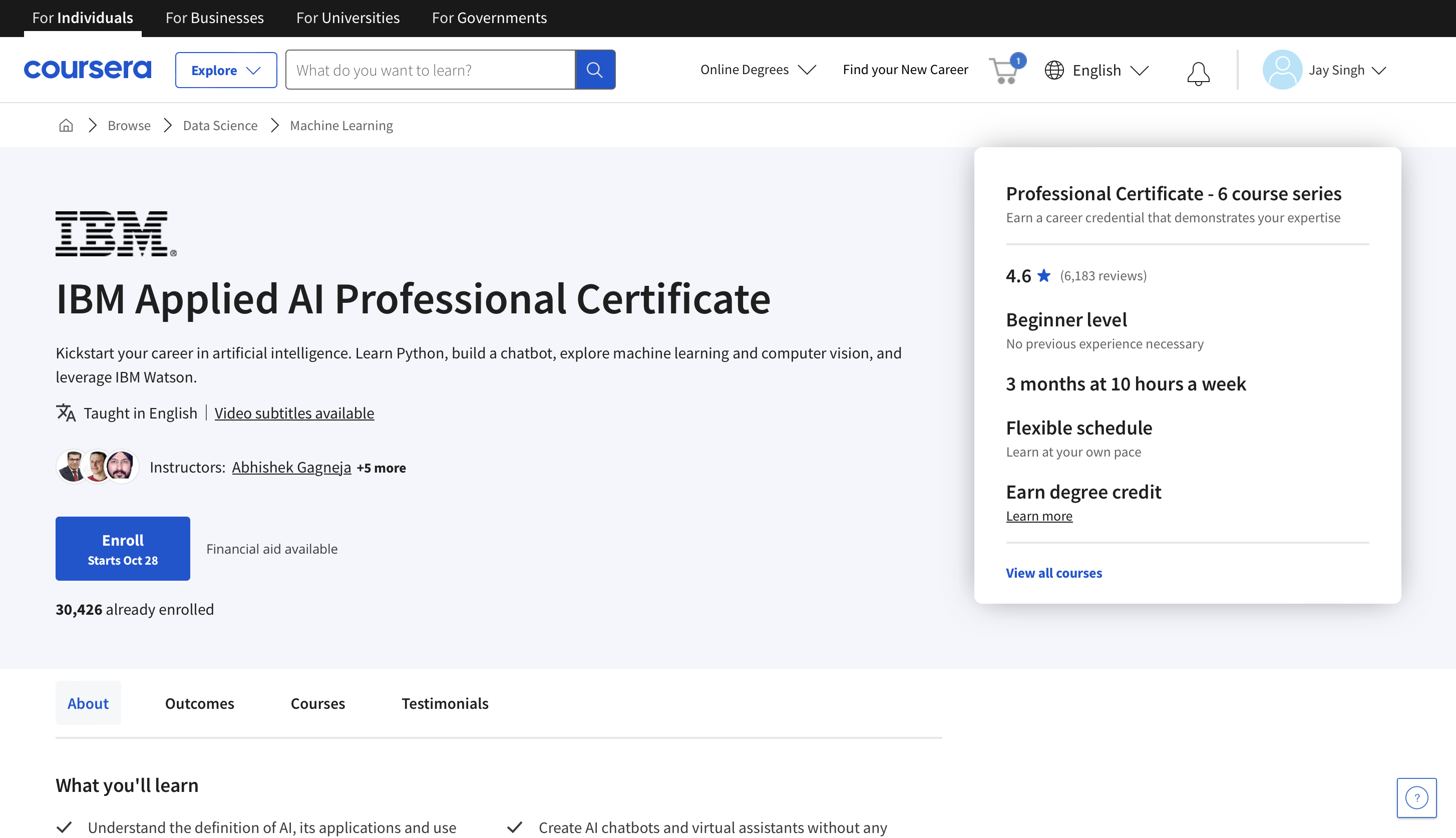
The course covers artificial intelligence, machine learning, Python programming, Watson AI, chatbots, deep learning, and application programming interfaces (APIs).
You’ll also go into data science, investigating technologies like IBM Watson AI services, OpenCV, and APIs to create AI-powered solutions through code.
The specialty is made up of six courses, each of which focuses on a distinct topic of applied AI. Introduction to AI, constructing AI-powered chatbots,
Python for data science, developing AI apps with Python and Flask, and building AI applications using Watson APIs are among the topics covered.
Each course is meant to build on the one before it, offering a thorough grasp of applied AI.
12. Introduction to Computer Vision and Image Processing
Presented by IBM on Coursera, the course “Introduction to Computer Vision and Image Processing” is a beginner-friendly course that aims to introduce students to the fascinating field of computer vision.
Computer vision has applications in a variety of industries, including robotics, augmented reality, and self-driving cars.
While some familiarity with Python programming and high school arithmetic is required, neither prior expertise with machine learning nor computer vision is required for this course.
You will learn to explain how computer vision is used in many sectors as well as how to solve computer vision issues by using image processing and analysis methods in this course.
To do fundamental image processing tasks like object identification and picture classification, you’ll use Python, Pillow, and OpenCV.
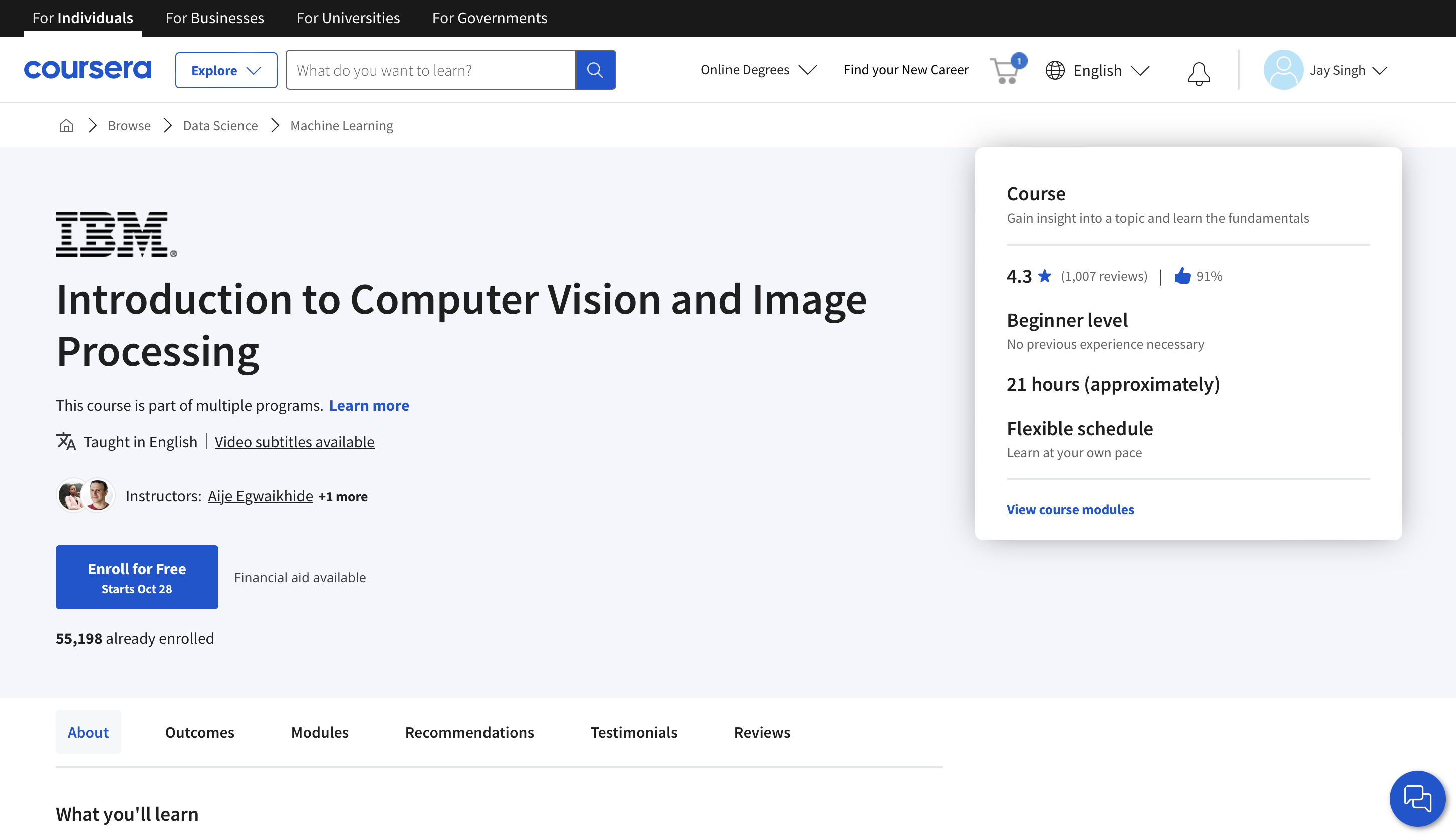
Making an image classifier with supervised learning approaches is another topic covered in the course. Six modules make up the course structure, and each one focuses on a distinct area of image processing and computer vision.
These include topics such as an overview of computer vision, object recognition, machine learning picture classification, image processing using OpenCV and Pillow, neural networks, and deep learning, and a project case on traffic sign classification.
This course emphasizes applied learning over merely theoretical understanding. By working on practical projects, you’ll develop a portfolio of your accomplishments that shows off your abilities in image processing and computer vision.
Jupyter Labs and Computer Vision Learning Studio (CV Studio), a free computer vision learning resource, will be combined in the labs.
You can upload, train, and test your own unique image classifier and detection models with CV Studio.
13. Modern Artificial Intelligence Masterclass: Build 6 Projects
The “Modern Artificial Intelligence Masterclass: Build 6 Projects” course on Udemy will take you on a thrilling trip into the heart of artificial intelligence.
This carefully planned course uses an engaging project-based learning environment to deliver a combination of academic knowledge and practical skills.
You’ll discover that every project in this learning environment is designed to reveal a different aspect of artificial intelligence, providing a comprehensive understanding of the field.
From machine learning to deep learning to the fascinating field of neural networks, the program is packed with interesting subjects.
With the help of six distinct projects, you will delve into the practical side of artificial intelligence (AI), making your learning experience dynamic and captivating.
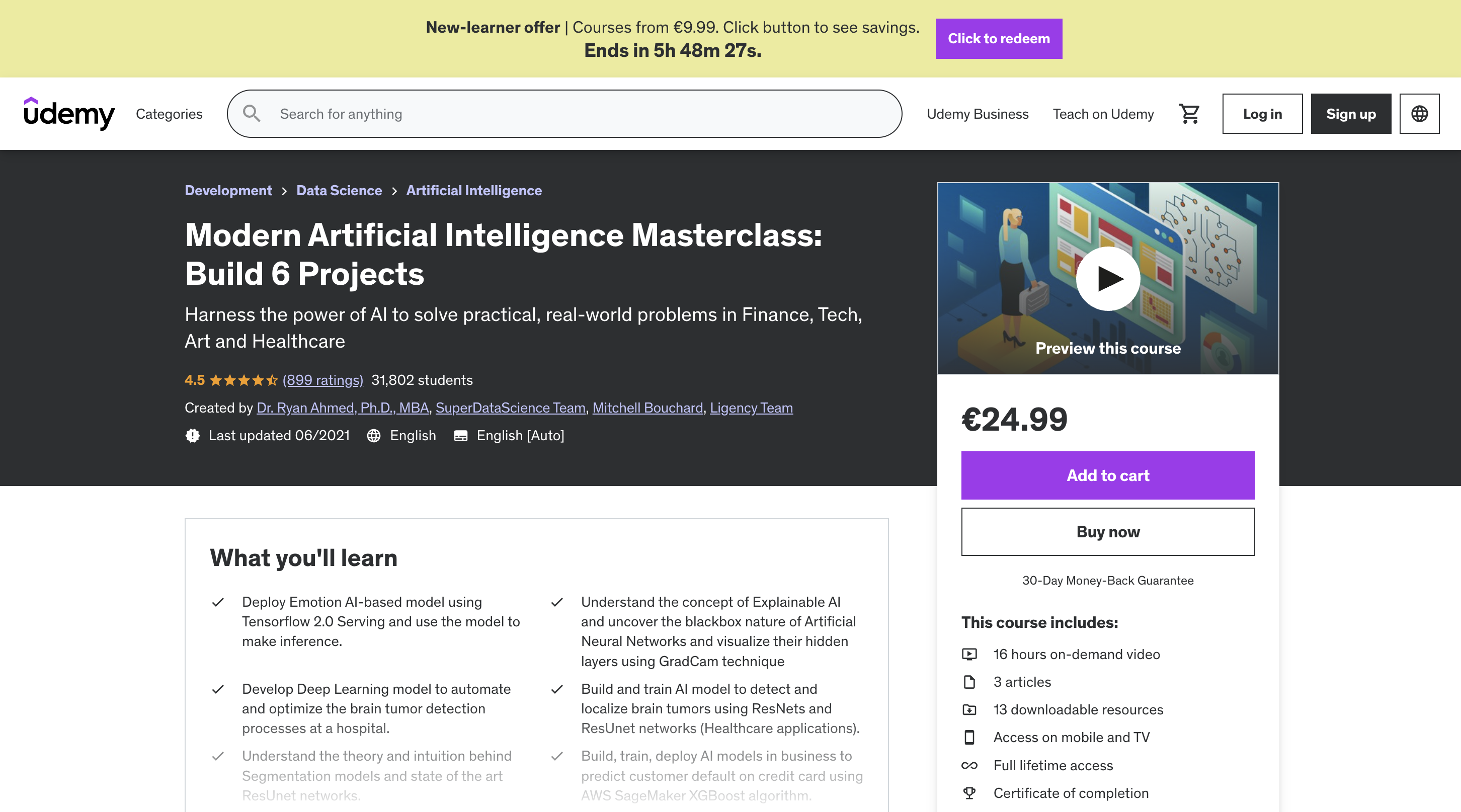
In order to ensure that you are not just learning the theories but also developing the ability to apply AI solutions, the course focuses a strong emphasis on practical practice.
Every project you work on is a step closer to becoming an expert in the methods and technologies that are essential in the AI sector.
You are an active participant who takes on challenges and reveals the wonder that artificial intelligence can produce, not just a passive student.
By offering a platform where your creativity and problem-solving abilities are refined via practical projects, the “Modern Artificial Intelligence Masterclass: Build 6 Projects” course goes beyond conventional learning techniques.
Your capacity to develop, build, and improve AI applications will be greatly increased as you progress through the course.
14. Artificial Intelligence with Machine Learning, Deep Learning
The “Artificial Intelligence with Machine Learning, Deep Learning” course acts as a guide for you during your investigation.
It offers a rich synthesis of theory and experience as it explores the fundamental algorithms and methods that drive contemporary artificial intelligence (AI).
This course combines Machine Learning (ML) with Deep Learning (DL) to provide you with the tools you need to navigate intricate data environments. Deep comprehension of AI, ML, and DL is encouraged by the way the course modules are organized.
By removing the layers of algorithms, they lead you through the reasoning behind them. To guarantee a comprehensive understanding, theoretical lectures, and practical activities are linked together.
Your capacity to create intelligent systems that can learn from data will improve as a result of working on real-world projects.
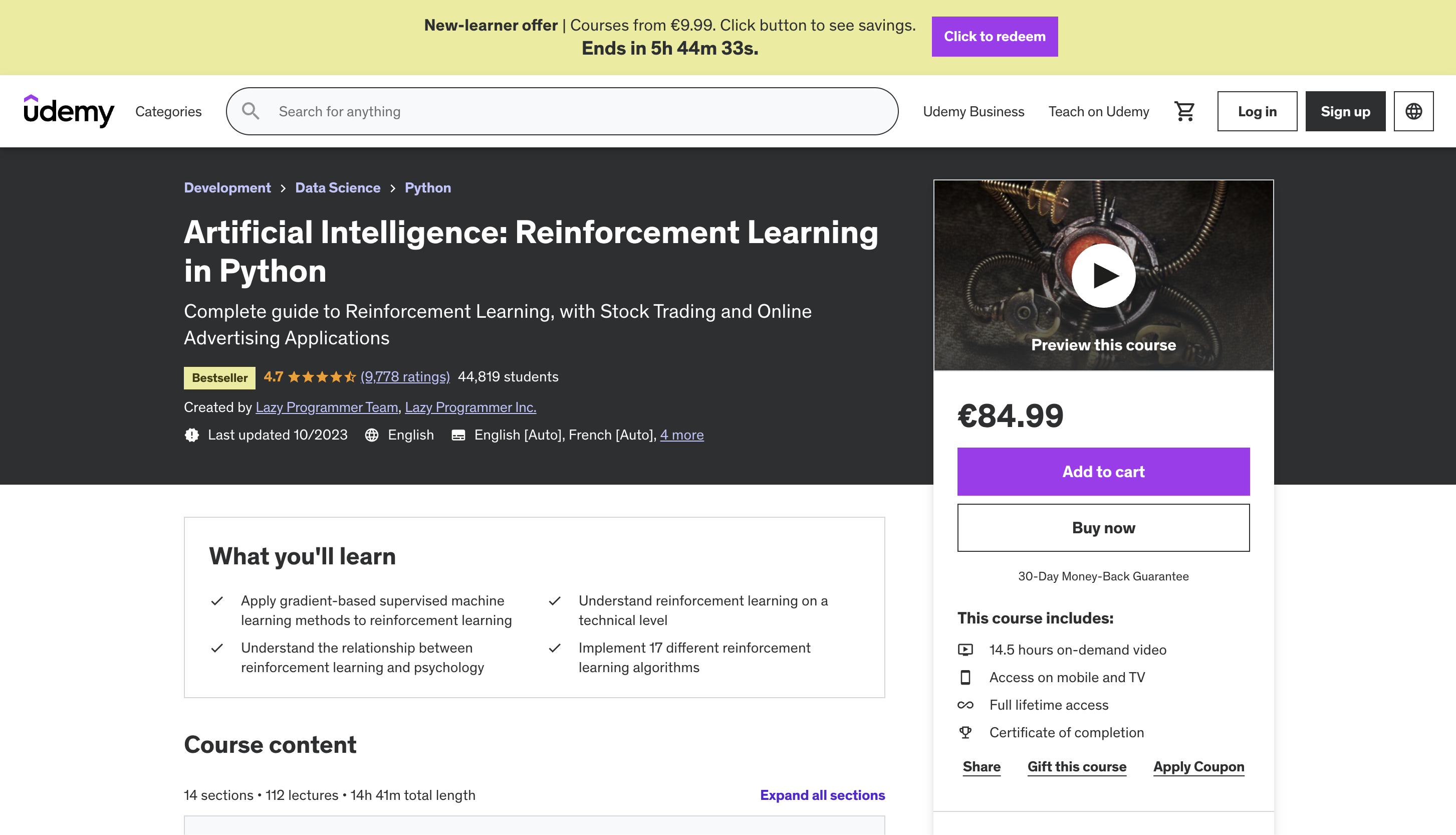
The attraction of machine learning (ML) and deep learning (DL) is their ability to find patterns in data—a critical ability that this course carefully develops.
By guiding you through the maze of neural networks, the mysterious field of deep learning will become more approachable.
Additionally, by clarifying the concepts of supervised, unsupervised, and reinforcement learning, the course demystifies the field of machine learning.
You will get a practical understanding of data preparation, model assessment, and optimization approaches from this course, guaranteeing that you understand the principles.
The training also clarifies the process of building, honing, and improving models in order to produce precise forecasts. The activities push you to use what you’ve learned, which promotes mastery as well as understanding.
15. Deep Learning A-Z 2023
Explore the world of data-driven insights by enrolling in the “Deep Learning A-Z 2023” course. This course serves as a lighthouse, showing the way to become proficient in deep learning, an essential branch of artificial intelligence.
It makes the difficult terrain of deep learning comprehensible by dissecting neural networks with its painstakingly designed components.
You will learn about the workings of convolutional and recurrent neural networks as you progress through the courses, which will provide you with a solid grasp of how computers receive and process complicated data.
The course also covers unsupervised learning, introducing you to the science and art of teaching computers to find patterns in unlabeled data.
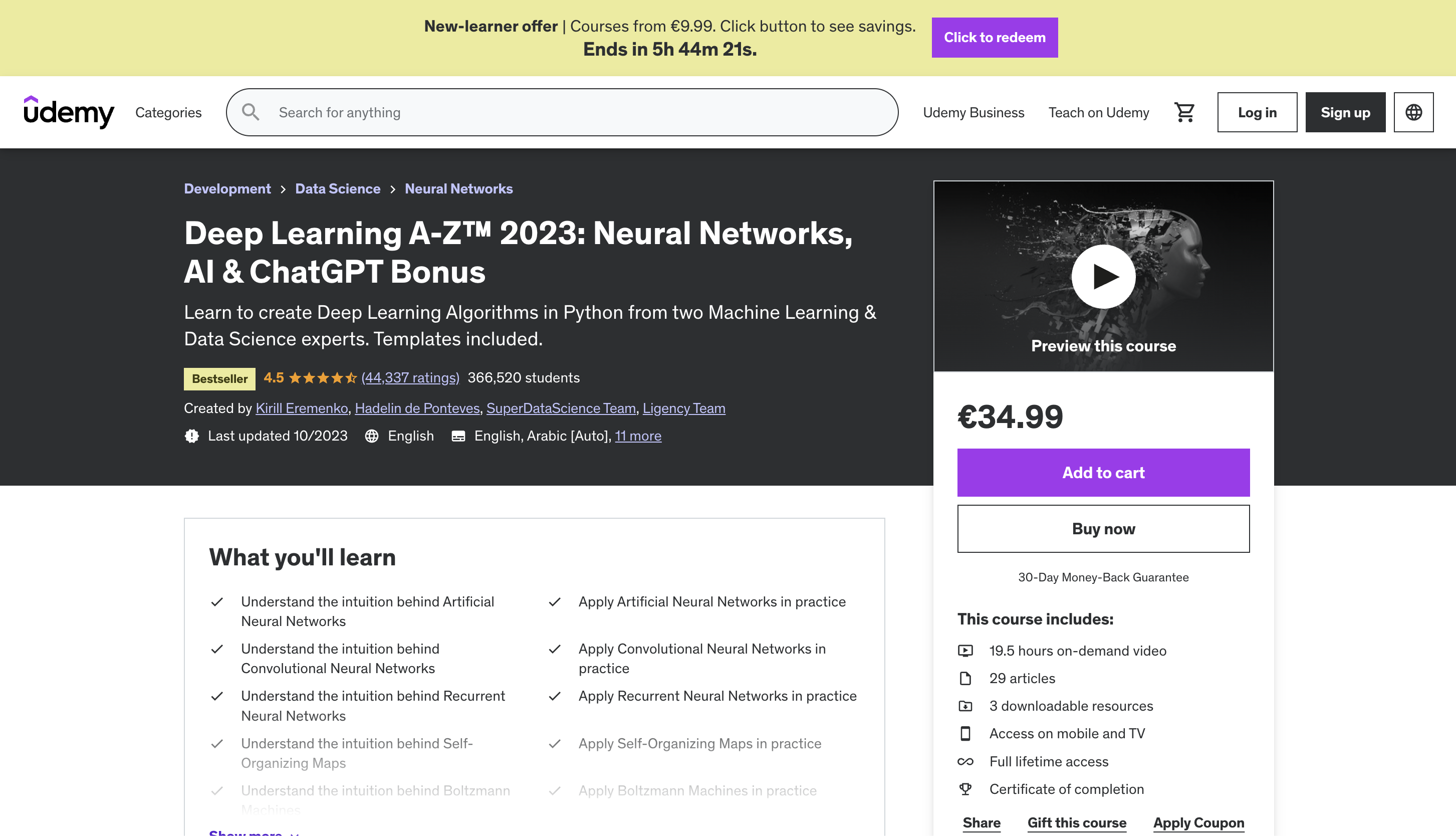
The foundation of the course is its practical component, which provides a means of putting academic knowledge to use in practical situations.
You’ll work on challenging projects that test your ability to apply deep learning models to tackle urgent problems.
These tasks are a playground for honing your abilities and making sure you understand the fundamentals of deep learning, rather than just an exam.
Understanding how to use Keras and TensorFlow, two fundamental tools for creating and refining reliable deep-learning models, is one of the course’s main takeaways.
Additionally, you will explore natural language processing, which will lead to the fascinating field of machine-human interaction.
In order to guarantee a comprehensive grasp of deep learning, the course also navigates the sea of reinforcement learning.
Conclusion
At first, sorting through the plethora of AI courses accessible to novices might seem like an overwhelming task. But once you start, the road to understanding the fundamentals of artificial intelligence is unquestionably thrilling.
These carefully designed courses provide a combination of academic knowledge and real-world experience to help beginners navigate the complicated realm of artificial intelligence.
An interesting learning environment is created by the interactive tutorials and practical projects that are the mainstay of most introductory courses.
Along with imparting the necessary knowledge, they also foster curiosity and a sense of success in the students.
The all-encompassing assistance and materials offered in these courses act as a strong launchpad, pushing aspirants into a future full of technological innovations.





Leave a Reply